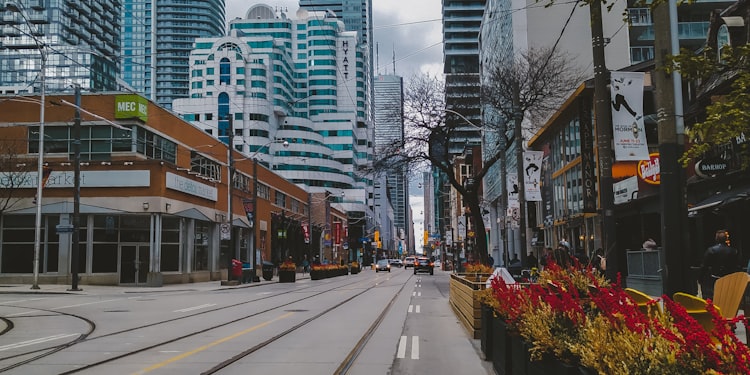Remote Work & Renewing Neighbourhoods

More Freedom and Flexibility, But To What End?
The cycle of loosening and subsequently tightening COVID-19 restrictions in Québec means that fewer and fewer people are sharing spaces with people outside of work. At the same time, fewer people are "going" to work at all. In the worst cases, this is due to layoffs, but more positively, many depopulated offices are only empty thanks to the remote work made possible by the internet and digital technology. The freedom of remote work is a dream more than 50 years in the making, and the coronavirus pandemic has forced the hand of companies into making it a reality for many.
For knowledge workers–those whose jobs are defined by moving data, words, and symbols around–it's the new normal. But is it good?
Writing at Ars Technica, Kate Cox cited the following from a California state study in the 1980s:
Remote work "enhances the quality of work life for telecommuters, including those with disabilities," the report found. "Telecommuting more than pays its way ... there are societal benefits as well."
The key quality of life takeaway here is that telecommuting implies the absence of an onerous physical commute. Remote work offers the freedom and flexibility of days unencumbered by hours spent in cars and public transport, isolated and in transit. As commutes get longer for many, upwards of 60 minutes each way each day,[1] the opportunity to reclaim that time with more than podcasts is certainly a benefit to individuals. And individual benefits, in turn, can then spin off into societal benefits, at least in theory.
So, there are obvious benefits to healing some of what Christopher Alexander calls the "intolerable rifts" created in people's lives by lengthy commutes and years of car-oriented development. There's a reason that so many people finish their days isolated and passive in front of Netflix's auto-play ease. But still, we have to ask: do the individual benefits of remote work necessarily result in societal benefits? More specifically, is remote work good for our neighbourhoods?
Drew Austin, author of the Kneeling Bus newsletter on urbanism and technology, also highlights the opportunity of eliminating long commutes. In terms of quality of life, closer is better. However, our current emergency work-from-home setup leaves a lot to be desired. Austin even suggests we may be feeling some nostalgia for those commutes to and from work.
The transition to widespread remote work is definitely saving people money and reducing emissions, but if it's going to last, we need a better solution, because few people's homes are well-suited to be their office as well, and privatizing every function of the outside world is wasteful in its own way.
As a freelance writer and contract worker I’ve experienced the pitfalls of digital nomadism. No office, no coworkers, no water-cooler but the waste and chaos of a social media feed. During the pandemic, I lost the stability of a long term contract which included access to an office and meaningful relationships. I also lost the freelancer consolation prize of coffee shops and libraries. Converting my small apartment into an even smaller home office to share with my wife hasn’t been easy. The difficulties of this transformation have as much to do with the nature of place as it does with the size of spaces.
The enforced turn inward necessitated by the pandemic may lead us down a road we don’t want to take, but it’s also given us a clear opportunity to reject the worst of the world UberEats, Netflix, and Amazon Prime want to create. What appear to be tools of convenience on the surface are instead, when taken to their logical conclusions, undermining the fundamental human need to participate in the ordinary rhythms of life, both private and public. I’m already burnt out on working in the same place I watch movies, eat dinner, worship, and play video games: my couch.
The flattening effect of convenience elevated to the level of supreme good is no good at all. In our conversation, Austin said that our “nostalgia for commuting points to a general crisis of placelessness,” a crisis which the internet has always slouched toward but that the pandemic has now applied to much of daily life. To this Austin adds:
We need different places for different activities, and right now we're being forced to jam too many different behaviors into the same spaces, which unsettles us on a fundamental level. This isn't just a problem for work/life balance, which offices and commuting have separated, but also for subsets of both, such as exercise, family time, education, worship, and political activism. The physical world offers extremely sophisticated mechanisms for separating these practices without us even realizing it, and mixing them together is clearly confusing us.
So if long commutes are bad and living a digitally mediated, homebound life is also bad, what are we left with? Perhaps we can find hope near at hand, close to home but not isolated. Maybe re-centring life around our domestic spaces doesn’t have to end in a turn inward, but presents instead the time and opportunity to enliven our neighbourhoods. We have an opportunity to heal the intolerable rifts between work and life by recovering the overlapping space between public and private.
Rather than retreating further into our homes (and staying there once restrictions ease), Austin suggests that “we can replace or supplement the traditional downtown office with something like neighborhood-based co-working pods,” as a way to redirect hours spent commuting back into local communities. Advocating for this kind of localism is one way to direct the individual benefits of remote work towards broader, societal benefits. Imagine a sort of public-option WeWork without the flash or controversy and filled with neighbours and opportunities to build social capital. It’s easy because there are already small-scale examples in Montreal, like the public-private co-op Temps Libre.
Local work spaces could provide the relationships and sense of belonging fostered by healthy workplaces. They could also prove to be a vital local point of connection and collaboration. Giving neighbours the opportunity to be coworkers even as we continue to work for different employers makes space to reinvest rescued commute time into our neighbourhoods for the common good.
The future of work—and future of the home—doesn’t have to look like a glossier retelling of E.M. Forster’s The Machine Stops. Instead, it can look a lot more like a neighbourhood where people actually want to live, work and play, together.
The average commute time in the US reached a new high in 2019. StatsCan reports similar data in Canada. ↩︎





Member discussion